
Vol. 75, No. 9, September
2002

Defining the Value of the Legal Profession
July 1, 2001 - June 30, 2002
Fiscal Year 2002 (FY02) was shaped in large part
by the events of September 11. The State Bar, with the leadership of
hundreds of volunteer lawyers, organized a statewide effort to assist
military personnel and their families with their legal needs, as the
nation's government responded to the acts of terrorism.
In partnership with the Government Lawyers Division, the State Bar
organized a series of CLE seminars to familiarize attorneys with the
Soldiers' and Sailors' Civil Relief Act and the Uniformed Services
Employment and Re-employment Rights Act. The State Bar sent videotaped
copies of the seminars to local bars and other legal entities statewide
upon request.
Lawyers who attended the seminars were added to a list of volunteers
to offer pro bono legal assistance to our Wisconsin National Guard and
federal reserve military personnel who were called to service. Wisconsin
lawyers are ready to provide military personnel and their families with
needed legal support in the way of wills, powers of attorney for health
care, estate plans, custody arrangements, business operation plans, and
the like.
The State Bar also maintains a list of attorneys who served in
previous military operations. Many attorneys who left their practices to
serve in Bosnia and the Persian Gulf were available to offer advice to
attorneys faced with similar issues today. Through the Military Legal
Assistance Program, Wisconsin lawyers reinforced the profession's
commitment to serve the community.
The theme of solving problems, sharing expert advice, and serving the
community that defined the Military Legal Assistance Program became the
core of a communications effort (known as "branding") that the State Bar
launched during FY02.
Wisconsin Lawyers: Expert advisers. Serving you.
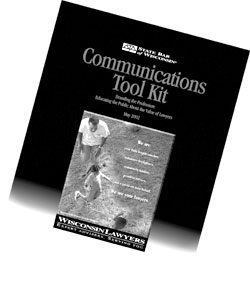 The
State Bar debuted a comprehensive communications effort in May to
educate the public about the value of lawyers. The effort arose out of
repeated requests from members to improve the image of the profession.
After a year and a half of research, the State Bar developed a unified
message for the State Bar and its members to educate the public about
the value of lawyers. It is not a glitzy advertising campaign, but
rather an educational effort.
The
State Bar debuted a comprehensive communications effort in May to
educate the public about the value of lawyers. The effort arose out of
repeated requests from members to improve the image of the profession.
After a year and a half of research, the State Bar developed a unified
message for the State Bar and its members to educate the public about
the value of lawyers. It is not a glitzy advertising campaign, but
rather an educational effort.
The brand was developed from solid research conducted with the public
and lawyers. To be effective, the supporting messages and tag line -
Wisconsin Lawyers: Expert advisers. Serving you. - must be repeated and
sustained over time. The three supporting messages - expert advice,
problem-solving skills, and community service - also must be
consistently incorporated into communications with clients and the
public. Collectively, the tag line, supporting messages, and logos make
up the brand.
The effort was guided by a steering committee of members statewide,
led by President-elect Patricia Ballman. The committee used the guidance
of a Madison-based public relations firm and worked with staff to
develop the brand. The State Bar produced a tool kit to offer lawyers,
law firms, and local bars assistance in incorporating the brand into
their communications. The tool kit includes camera-ready print
advertisements and logos that promote the value of the profession, as
well as public opinion research and tips on effective communication.
More than 800 free tool kits were distributed to Annual Convention
attendees in May. The kits are available for free download at
www.wisbar.org/branding.
In this annual report, FY02 activities are organized under three
categories that directly support the new communications effort on behalf
of the profession: expert advice, problem solving, and service to the
community and the profession. Due to space constraints, this report
features only a sampling of the organization's many activities.
Providing Expert Advice
The State Bar provides a range of products, services, and educational
opportunities that help lawyers fine-tune their skills, stay up to date
on the latest legal news and trends, and keep lawyers connected with
each other. Such offerings help lawyers provide expert advice to their
clients.
Educating Legal Professionals
CLE Seminars
In FY02, CLE Seminars collaborated with
sections, committees, and professional organizations to produce 40
different titles, resulting in 62 live seminars and 484 video
presentations serving 10,297 registrants. The high-quality seminars
proved to be a real value in both cost and ease of acquiring credits.
The continuing challenge is to investigate delivery systems that will
make quality continuing education even more accessible.
Seminar Highlight. At the end of FY02, the State Bar
presented a seminar on toxic mold, which drew the attention of lawyers,
contractors, subcontractors, builders, building managers, insurers, and
real estate brokers. A half-dozen local and statewide media reported on
the seminar, which covered all issues relating to mold
contamination.
Alternative Delivery Options for CLE. The State Bar
offers telephone seminars each fall for regular and ethics credits. This
provides members with the convenience of obtaining required ethics
credits in the comfort of their office and over their lunch hour. More
than 150 members signed up for each of five separate courses. At the end
of FY02, the State Bar was preparing to offer for the first time a "live
satellite" seminar at six video sites. The interactive seminar featured
a national speaker.
CLE Books
CLE Books worked with hundreds of volunteer authors who contributed
their expertise to produce the following:
- the new Wisconsin Traffic Law Codebook, increasing the
number of CLE titles to 73;
- 24 book supplements, including an update to the Probate Document
Assembly software;
- a completely revised Civil Procedure Before Trial; and
- new editions of the Annual Survey of Wisconsin Law and
seven titles in the Codebooks series.

The State Bar's Annual Convention offered CLE programs
attended by more than 1,000 legal professionals.
Annual Convention
More than 1,000 attendees gathered in May at the 2002 State Bar Annual
Convention in Madison at the Monona Terrace Convention Center to share
expert advice and participate in networking opportunities. The
convention offered more than 25 CLE programs sponsored by sections,
divisions, and committees. CLE Spotlight programs attracted large
audiences. Civil liberties lawyer Alan Dershowitz and juvenile justice
expert James Bell spoke on "Disparities in the Justice System."
Nationally known law firm management guru Jay Foonberg spoke on
"Managing Your Practice Like a Professional." An Assembly of Members
debated multidisciplinary practice and other issues affecting the future
of the practice of law.
The convention offered more than CLE programs and business meetings
that add to lawyers' legal expertise and problem-solving skills. The
contacts made and renewed add to the camaraderie that makes practicing
law in Wisconsin so rewarding. The information shared during the
convention affects the future of Wisconsin's legal profession.
The 2003 State Bar Annual Convention will be held May 7-9 at the
Midwest Express Center in Milwaukee.
WisBar
WisBar, the State Bar's member-focused Internet site, continued
to provide members access to legal resources and information. In FY02
WisBar expanded its offerings to include a Legal Career Center that
offers job seekers and employers access to a national career network of
nearly 3,500 legal positions and resumés.
In late FY02, the State Bar began a planning effort to redesign
WisBar using a long-term, strategic approach. Since its launch in 1996,
WisBar has become a key delivery mechanism for information and products,
and its importance to members and others is growing. Last year, for
instance, 5.5 million pages of material were accessed from the site.
Work sessions were held with members and staff to identify goals,
issues, and priorities. Goals include: increasing the value of WisBar
content, creating a community for lawyers, improving interaction with
members, increasing site usability, making site evolution easier, and
decreasing the cost of internal operations. The work begun in FY02
continues with additional user research and prototype design and
testing.
Wisconsin Lawyer
The Wisconsin Lawyer is recognized as a professional,
high-quality publication by the American and other bar associations. Bar
members consistently rate the magazine as one of the top benefits of
membership. In FY02 the publication continued to provide substantive
articles, how-to columns, notices of changes to court rules, and more.
The magazine will celebrate its 75th anniversary in 2003.
Economics of Practice Survey
In FY02 the State Bar conducted its third Economics of Law
Practice Survey, a direct result of the hundreds of inquiries received
annually from members. The survey assists members in measuring their
ability to share their legal expertise and help solve client problems in
a cost-effective manner. The survey covered law firm economic issues
such as billing practices, attorney hourly rates, and overhead expenses.
An article providing a snapshot of the survey appeared in the December
2001 Wisconsin Lawyer.
Electronic Communications
For the first time, State Bar leadership used broadcast email
technology in FY02 to alert members to important issues such as the
military legal assistance seminars. The Bar is developing guidelines for
member email use to ensure appropriate use of such technology.
The State Bar relies on several other forms of electronic
communication to share timely information with members and to enable
members to communicate with one another on a variety of topics. There
are 8,700-plus subscriptions to the Bar's 86 electronic mailing lists on
various subjects, from practice areas to section discussion groups to
organization governance and more. The Bar also provides CaseLaw Express,
a popular free service that emails weekly Wisconsin Supreme Court and
Court of Appeals decisions to 4,157 subscribers, and Capitol Update, a
free legislative update newsletter that is emailed to 253 legislative
grassroots participants.
Web-based Law Office Staff Training
In FY02 the Bar began a research and development project to
explore the feasibility of offering law staff training via the Web. The
project has produced and is testing prototype staff training courses.
Traditionally offered via videotape, Web-based training offers members a
low-cost, convenient, and expanded curriculum for their support staff on
such topics as client confidentiality and telephone skills.
Advocating Before Government
At its core, the State Bar's government relations
program is a member and public service. The program again was successful
in FY02 on many issues of importance to the legal profession and the
State Bar and its practice sections, including:
- working to allow for the use of DNA evidence for both the
prosecution and defense;
- spearheading enactment of major revisions to UCC Revised Article
9;
- working to see court interpreter provisions enacted;
- working to keep funding for federal and state civil legal
services;
- moving Next Economy Legislation on business conversions and mergers
through to enactment; and
- leading the enactment of the Mendez jurisdictional
fix.
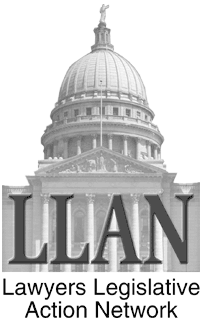 The
Lawyers Legislative Action Network (LLAN) is the State
Bar's free legislative grassroots program that keeps State Bar members
informed on developing legislation so members can keep the legislature
in touch with the legal profession and the public it serves. Volunteers
in LLAN work diligently to ensure that the state Legislature and
Congress are aware of the impact of legislation on the courts, the
profession, and the public. LLAN's success is evident in many ways,
including the regular requests it receives from legislators, lawyers,
the public, and the media seeking information on important legal
issues.
The
Lawyers Legislative Action Network (LLAN) is the State
Bar's free legislative grassroots program that keeps State Bar members
informed on developing legislation so members can keep the legislature
in touch with the legal profession and the public it serves. Volunteers
in LLAN work diligently to ensure that the state Legislature and
Congress are aware of the impact of legislation on the courts, the
profession, and the public. LLAN's success is evident in many ways,
including the regular requests it receives from legislators, lawyers,
the public, and the media seeking information on important legal
issues.
The Bar's government relations team produces Capitol Update on WisBar, an online service that
informs members about federal and state legislation that affects the
legal profession and justice system. From the Capitol Update
page, visitors to the site can track bills, review the legislative
session calendar, email legislators, participate in discussion groups,
and review State Bar and section positions on legislative issues.
Working to Solve Problems
State Bar committees, sections, and divisions are
the heart of the organization. They sponsor a number of initiatives that
help lawyers, local bars, and others within the justice system solve
problems facing the profession, and that support ways for members to
effectively solve client problems.
Debating Multidisciplinary Practice
As a follow up to Past President Gary Bakke's year-long Seize the
Future initiative in FY01, the convention featured an Assembly of
Members to discuss multidisciplinary practice (MDP) and related future
of the profession issues. At the beginning of FY 02, the State Bar
organized a MDP Commission of 25 lawyers and nonlawyers who shared
different opinions on the benefits and harms of MDP to the future of the
legal profession. Under the leadership of cochairs Bakke and
President-elect Pat Ballman, the commission worked tirelessly in FY02 to
gather research on, study, and debate the merits of MDP.
More than 150 members attended the Assembly, where the MDP Commission
presented its interim report covering such issues as: amending the Rules
of Professional Conduct relating to MDP firms; defining the practice of
law; prosecuting the unauthorized practice of law; petitioning the
Wisconsin Supreme Court regarding entities that provide legal advice or
service to low or moderate income individuals; and amending the rules
governing law firms' conduct of ancillary businesses and receiving
commissions for client referrals.
At the close of convention, the Board of Governors continued to
debate MDP, unauthorized practice of law, and ancillary business
practice issues. The board will have a full discussion at its September
meeting and plans to vote in November. The report is available at
www.wisbar.org/bar/mdp.
Improving Public Trust & Confidence in the Legal System
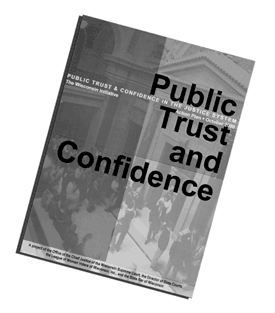 In FY02
the Public Trust & Confidence Committee, a partnership of the State
Bar, the Office of the Chief Justice, the Director of State Courts, and
the Wisconsin League of Women Voters, organized several key initiatives
to address issues of top concern in the justice system. The committee
sponsored three project grants, including a program to help pro se
litigants, a project to translate domestic violence material into
Spanish, and an initiative to look at disparate charging practices.
In FY02
the Public Trust & Confidence Committee, a partnership of the State
Bar, the Office of the Chief Justice, the Director of State Courts, and
the Wisconsin League of Women Voters, organized several key initiatives
to address issues of top concern in the justice system. The committee
sponsored three project grants, including a program to help pro se
litigants, a project to translate domestic violence material into
Spanish, and an initiative to look at disparate charging practices.
The Public Trust Committee culminated its work with a community forum
on the disproportionality of minority youth in the justice system at the
May convention. More than 200 lawyers, judges, legislators, local
elected officials, child welfare workers, and law enforcement personnel
gathered for the half-day program.
Encouraging Diversity
The State Bar supports several initiatives aimed at diversifying the
profession and participation within the Bar to better reflect
society.
Summer Clerkship Program. In FY02, 18 first-year law
students were placed in law firms, corporate legal departments, and
government agencies for 10 to 12 weeks. Now in its ninth year, the
Committee to Encourage the Placement of Minority Lawyers, which
coordinates the clerkship program, has given more than 120 students
practical exposure to legal environments, while enabling participating
employers to promote diversity within their own organizations.
In addition, for the last four years, the State Bar has participated
in the Urban League of Greater Madison's Pre-Employment Program. The
program provides career awareness and exposure, employability skills
training, and paid job experiences to minority and low-income eighth
grade students.
2001 Diversity in the Legal Profession Event.
"Strategies for Change" was the focus of the June complimentary luncheon
program, with a keynote talk by Stacey Mobley, Du Pont senior vice
president and general counsel. Mobley focused on Du Pont's diversity
initiatives and its current strategies for promoting and retaining a
diversified workforce both in its legal department and its workforce as
a whole. The program was a collaborative effort of the State Bar's
Diversity Outreach Committee and Diversity Counsel Program and the
Wisconsin chapter of the American Corporate Counsel Association.
Connecting with Local Bars
The State Bar supports county, regional, and specialty bar
associations in their efforts to improve the justice system and the
practice of law within their purviews by conducting strategic planning
sessions, providing an electronic mailing list for bar leaders,
providing speakers for local bar programs, maintaining resource files
with successful program and project ideas, assisting local bars in
setting up local volunteer hotlines, assisting with local courthouse
visitors' guides and Law Day activities, and sponsoring an annual Bar
Leaders Conference and the Local Bar Grant Competition.
Wisconsin Bar Leaders Conference. More than 70
leaders representing 42 local and specialty bar associations shared
their successes and challenges at the 2002 Wisconsin Bar Leaders
Conference at the State Bar Center in Madison in April. Work shops and
breakout sessions offered leaders the opportunity to develop their
leadership skills, network with other bar leaders, explore methods of
maintaining an active and growing membership, and build a sense of
relevancy for their respective associations.
Local Bar Grants. The Local Bar Grant Competition
Committee continued in FY02 to award funds to local and specialty bar
associations that develop public service projects having statewide
application. In FY02, $10,000 was awarded for grant projects, including:
establishing a pro se center for post-divorce litigation; providing pro
se litigants access to information and forms to assist them with family
court pleadings, motions, and stipulations; developing a booklet on
small claims in the Hmong language; researching and standardizing court
forms used by pro se litigants in the 10th Judicial District; and
updating a Hmong language legal dictionary.
Reimbursing Clients of Dishonest Lawyers
The Wisconsin Supreme Court established the Clients' Security
Fund in 1981 to reimburse people who lost money through
dishonest acts of attorneys. All active Wisconsin-licensed attorneys
subsidize the fund through an annual assessment of up to $15. During
FY02 the supreme court approved a petition to increase the mandatory
assessment to up to $25.
The increase in assessment was requested because the fund has
operated with a deficit for several years due to the high dollar amount
of claims approved. In FY02 the committee acted on 38 claims against 23
attorneys. Of these, 24 were approved for reimbursement (totaling
$47,557), 10 were denied, and four were deferred to FY03.
Counseling Troubled Professionals
The Wisconsin Lawyers Assistance Program (WisLAP)
continued to provide confidential, meaningful assistance to lawyers,
judges, law students, and their families in coping with alcoholism and
other chemical addiction, depression, acute and chronic anxiety, and
problems related to the stress of practicing law. In FY02 the State Bar
hosted its first celebration dinner to recognize WisLAP volunteers.
Providing Ethics Guidance to Lawyers
Ethics opinions of the Bar's Professional Ethics Committee apply the
Rules of Professional Conduct for Attorneys and the prior standards in
the Code of Professional Responsibility to specific factual situations.
Although not binding, these ethics opinions constitute an important
source of ethics guidance for Wisconsin lawyers. Formal ethics opinions
address fairly broad questions and are issued in response to requests by
State Bar members. In addition, the Bar offers an Ethics Hotline to
immediately assist lawyers in interpreting and applying the rules to
their practice situations. In FY02 the State Bar's Ethics Hotline
attorney handled 1,747 calls.

During the year the State Bar sponsored numerous networking
and education opportunities for Wisconsin's legal
community.
Advising the Court on Practice Issues
The State Bar plays an important role in advising the courts on
issues affecting the practice of law in Wisconsin. In FY02 State Bar
leaders testified on several petitions, including the following that
were adopted in some form by the Wisconsin Supreme Court:
- a petition requesting the supreme court to adopt a code of ethics
for court interpreters;
- a petition to amend the composition of the Board of Governors and
establish a Senior Lawyers Division;
- a petition to amend the eligibility requirements for appointment as
a guardian ad litem for a minor;
- a petition to create a rule providing guidance to court staff on
assisting court users; and
- a petition to amend SCR Chapters 21 and 22 relating to
- the lawyer regulation system.
Serving Our Communities
The State Bar and its members are very involved
in serving the community through law-related education and pro bono
legal assistance. Wisconsin lawyers also are committed to serving the
profession and the public by sharing their expertise with legislators
and other decision-makers to positively impact the legislative process
and improve the administration of justice.
Providing Law-related Education
Peer Mediation. Educators from 16 elementary schools
statewide learned about peer mediation and ways to teach it at the
annual PEACE (Peers in Education Addressing Conflict Effectively)
program during FY02. The State Bar, the Office of the Attorney General,
and the Wisconsin Law Foundation cosponsored two days of intensive
workshops. Now in its sixth year, the PEACE program helps reduce
violence in Wisconsin elementary schools by teaching children
communication and problem-solving skills.
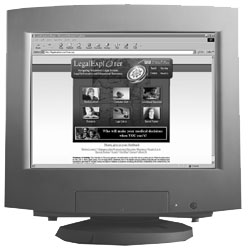
LegalExplorer, the Bar's consumer Web site, helps the public
navigate Wisconsin's justice system with a wealth of legal information
and educational resources. Visitors to the site can access the Lawyer
Referral and Information Service, read consumer alerts and special
features on timely topics, and find quick answers to their legal
questions.
Approximately 28,000 Wisconsin elementary school students currently
participate in the PEACE program, which includes pairing teachers with
attorneys in their communities to serve as consultants.
Mock Trial Tournament. The State Bar of Wisconsin
High School Mock Trial Tournament attracted 500-plus attorneys and
judges statewide who volunteered their time and expertise to make the
FY02 program a success. In addition to attorneys and judges, more than
140 teachers and 26 regional coordinators helped organize the
tournament, made up of 170 teams. The number of teams has more than
doubled since the tournament's inception in 1983.
The two teams that compete in state finals argue a fictional mock
trial case - written by the State Bar's Law-related Education Committee
- before six Wisconsin Supreme Court justices. Mock trial sponsors
include the Wisconsin Trust Account Foundation, the Legal Auxiliary of
Wisconsin, the Wisconsin Association of School Boards, the Wisconsin Law
Foundation, and individual attorneys and citizens. Rhinelander High
School won the state competition and then went on to place fifth
nationally at the National High School Mock Trial Championship held in
St. Paul, Minn., in March.
Teaching Institute. In February, 24 high school
teachers participated in the second annual Wisconsin Justice Teaching
Institute. Assisted by supreme court justices, circuit court judges,
attorneys, and university professors, the teachers took part in a
sentencing exercise, analyzed actual supreme court petitions for review
to determine whether they had been granted or denied, learned how to
pick "teachable" appellate court cases, heard a panel discussion on
judicial independence, and much more. Resources provided are valuable
materials for teaching about the courts and the law. As a culminating
activity, teachers put on a moot court in the Wisconsin Supreme Court.
The institute is a partnership between the State Bar's Law-related
Education Committee, the Wisconsin Supreme Court, and the U.W.
Department of Curriculum and Instruction.
Project Citizen. During FY02, the State Bar
cosponsored the "We the People, Project Citizen" competition - a
hands-on civic education program for middle school students to promote
competent and responsible participation in state and local
government.
The competition attracted 14 public policy portfolios represented by
six middle schools to the State Bar Center for two days of judging.
Panels of judges - state legislators, government leaders, and marketing
professionals - scored the portfolios and hearings. Project Citizen was
sponsored by the Wisconsin Law Foundation, the State Bar of Wisconsin,
the Center for Civic Education, the National Conference of State
Legislatures, and the U.S. Department of Education.
We the People ... The Citizen and the Constitution.
In FY02 the State Bar's Law-related Education Committee again
coordinated the intensive, weeklong "We the People ... The Citizen and
the Constitution" program. In existence since 1987, We the People is a
national program directed by the Center for Civic Education and funded
by the U.S. Department of Education. Based on a curriculum designed to
promote a deeper understanding of the Constitution and the Bill of
Rights, the goal is to promote civics competence and responsibility
among elementary, middle, and secondary school students in public and
private schools.
In addition to numerous Wisconsin schools using the We the People
materials, six schools participated in a mock congressional hearing in
January by testifying at the State Capitol before panels of teachers,
lawyers, elected officials, and community leaders. The winning school
went on to represent Wisconsin at the national tournament in Washington,
D.C., in May. Heritage Christian High School from West Allis placed
third nationally. This was the highest finish ever for a Wisconsin
team.
Offering Consumer Information
LegalExplorer.com. The Bar's consumer Web site,
LegalExplorer, helps the public navigate Wisconsin's justice system with
legal information and educational resources. Visitors to the site can
access LRIS; click through a legal dictionary; read consumer alerts
about the perils of identity theft, home repair fraud, and other timely
topics; learn about law-related education programs and publications;
read special features about current topics of general interest to the
public; conduct a title or key word search for resources to help resolve
legal issues; and find quick answers to their legal questions.
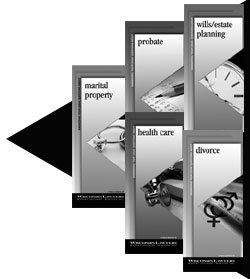
The consumer pamphlet redesign includes the new brand tag
line - Wisconsin Lawyers: Expert advisers. Serving you. - reinforcing
that the series is a public service of Wisconsin lawyers.
Consumer Information Pamphlets. The Bar's series of
18 consumer information pamphlets also is available on LegalExplorer.
Updated frequently, the series covers legal issues that many people face
sooner or later in their lives. Each pamphlet answers commonly asked
questions, defines basic terms, and explains concepts in plain English.
In FY02 the Bar began to redesign the pamphlets to incorporate the Bar's
new brand tag line - Wisconsin Lawyers: Expert Advisers. Serving You. -
and update their appearance.
Providing Access to Lawyers
In FY02 the public continued to benefit from attorneys registered
with the Lawyer Referral and Information Service
(LRIS).
Consumers reach LRIS through two separate vehicles - over the phone
and online. The service, which began offering referrals on the Bar's
consumer Web site in FY01, consistently has more than 30 percent of its
referrals coming from LegalExplorer.com. In some months of FY02, those
numbers were as high as 50 percent. Interestingly, the Web site's
existence has not decreased the number of phone calls to the service,
which remained at more than 50,000. LRIS also continues to provide
prescreened telephone referrals. Experienced legal assistants screen
calls and refer only about one in six callers to an LRIS panel attorney;
the remaining callers are given necessary information or referred to a
community agency or other legal resource.
Supporting Pro Bono Programs
As part of its commitment to providing legal services to low-income
citizens, the State Bar's Team Pro Bono volunteers
provide free or reduced cost legal services to prescreened clients. The
volunteers also advise lawyers who provide legal services to clients,
organize pro bono projects, and contribute financial assistance.
Pro Bono Planning Group. The State Bar Legal
Assistance Committee participated in a state planning group as a
stakeholder to assist in developing a plan to submit to the Legal
Services Corporation (LSC) for federal funding to deliver legal services
to the poor. This plan - which divides the state into a two-agency
system - was required by LSC to qualify for federal funding.
Honoring Community Service Work
Again in FY02, attorneys, judges, law firms, law-related
organizations, and law students who made outstanding pro bono, public
service, or law-related education contributions in 2001 were honored at
the Volunteer Lawyers Recognition Celebration held during the Annual
Convention in May. Fifty-year members were recognized and the Judge of
the Year and Lifetime Jurist awards were presented at the Members'
Recognition Luncheon, also at the convention.
The American Bar Association has long considered the State Bar of
Wisconsin to be one of the most innovative, productive, and
service-oriented bars in the country - a distinction directly
attributable to the strong volunteerism of Wisconsin lawyers.
Wisconsin
Lawyer
